Unfairly represented!
With elections around the corner, the focus is once
again on empowering women in the political arena:
by Dhaneshi Yatawara
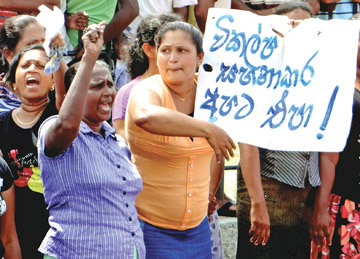 There is no gainsaying that empowering women in the political arena
has the potential to change societies, and their involvement in
governing bodies at the national and local levels can translate to
policies and legislation that are focused on women, children and
families. Yet, the battle for fair political representation for women in
Sri Lanka continues to be a one-step-forward-two-steps-back shuffle,
with every move forward countered with roadblocks and every election
rendered a mountain hard to climb. There is no gainsaying that empowering women in the political arena
has the potential to change societies, and their involvement in
governing bodies at the national and local levels can translate to
policies and legislation that are focused on women, children and
families. Yet, the battle for fair political representation for women in
Sri Lanka continues to be a one-step-forward-two-steps-back shuffle,
with every move forward countered with roadblocks and every election
rendered a mountain hard to climb.
Sri Lanka was one the first countries in South Asia to give women the
right to vote and holds the top honour of having the first women Prime
Minister in the world. The country is demographically women tilted, with
a 51.14% female population, and women have made significant progress in
the fields of health, education and employment, making the country a
model to the region. Yet, none of these have translated into fair
representation of women in Parliament or Local Government bodies.
This is despite, equal rights of women to be elected to political
office as men, protecting them from discrimination on the basis of sex,
being guaranteed in Article 12 of the Constitution, favourable human
development indicators, with the constitutional guarantee of equality
and policy statements making a commitment to equal representation of
women.
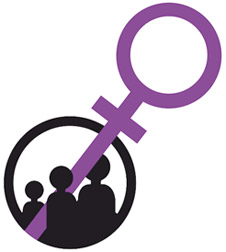 A 2009 United Nations Development Programme (UNDP), stock taking
report titled 'The struggle for equal political representation in Sri
Lanka', quoting a survey conducted by 'We Women', a coalition of women's
organisation, states that over 75% of the ordinary Sri Lankans were
unaware of the number of women in Parliament and in Local Government. It
also states that under representation of women in political bodies is
yet to be recognised as a critical issue of concern for women. A 2009 United Nations Development Programme (UNDP), stock taking
report titled 'The struggle for equal political representation in Sri
Lanka', quoting a survey conducted by 'We Women', a coalition of women's
organisation, states that over 75% of the ordinary Sri Lankans were
unaware of the number of women in Parliament and in Local Government. It
also states that under representation of women in political bodies is
yet to be recognised as a critical issue of concern for women.
Under representation of women in political institutions has been a
hotly contested issue, with a wide spectrum of women ranging from
academics to activist, individually and collectively, lobbying for a
legal
reservation/quota for women as a crucial remedy to the lopsided
political reality. They have reiterated the simple fact that in order
for women to have a voice in Sri Lanka's recovery and development
processes, they need to be represented not only in economic and social
spheres, but also at the political level.
Affirmative action
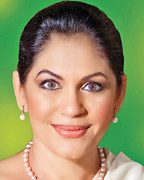 |
|
Rosy Senanayake |
State Minister of Child Development Rosy Senanayake is of the view
women parliamentarians interested in increasing political representation
of women had no other choice but to go for an affirmative action. "I've
been in this fight for a very long time and when I presented an
amendment to the Local Authorities Act, it did not get due recognition
in the parliament stating that it is not relevant," she pointed out.
Despite the minimal support she received then, Senanayake said being
able to convince the decision makers to increase women's quota in the
electoral reforms under the 20th Amendment was a turning point. "If we
do not get it done now, we will not be able to make it happen later,"
she added.
She also pointed out that there are enough and more women, with value
and vision, to be a part in active politics, emphasising "They only need
a proper platform to be given."
Political aspirations
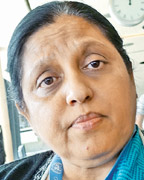 |
|
Nimalka Fernando |
A few women's organizations have attempted and are still attempting
to take a more bottom up approach to the problem of political under
representation, despite criticisms on these initiatives that they are
few and far between. With 'good governance' on the presidential agenda,
and a change in political culture pledged by all parties in the 'March
12 Declaration', can women expect some sort of fruition of their
political aspirations?
Attorney-at-Law Nimalka Fernando, a veteran activist in women's
rights, and one of the women attempting the bottom-up approach, does not
see any significant changes happening, despite efforts by women's groups
to secure assurance from the main political parties to introduce laws
increasing women's representation in the next Parliament.
"They always agree, but postpone making any decision for the next
election and that decision continues to get postponed," she lamented
adding, that it is an excuse she had heard resonating since 2000 and it
shows there is no real effort on the part of the political to embrace
the issue. Since 2000, Fernando personally invested her time in
contesting,
propagating and campaigning to increase the quote of women
represented in Parliament. Candid as always, she alleged that other than
one or two of the women politicians at national and local levels, the
rest prefers to keep the numbers nice and small. "It's less competitive
and ensures their positions comfortably in the fray."
Fernando also accused some of the women politicians being very
corrupt politicians and some blatantly ignoring the real issues to
secure their positions. "Some women politicians have never uttered a
word about the serial killing of women in their own area - those women
being their voters. We are not talking about that category of women
politicians," she pointed out.
Fernando insisted that women in politics should be a strong cadre who
can tackle the social, economical and political issues women are facing.
"We need women who are capable of responding to burning social and
economical issues faced by women," she said, adding, "It is not a pure
question of power. We are a country with a gendered poverty dimension
and we are living in a post-war era where nearly 90,000 women headed
households."
Contesting independently
Fernando is of the view that if women are unable to get
representation in the political sphere, there will be no sustainable
solutions to the issues faced by this segment of the population. "Male
politicians will not be able to give the right priority to these burning
issues," she pointed out.
Fernando is pragmatic enough to acknowledge, based on her own
experience, that women contesting independently may not be able to draw
enough attention, as voters are more attracted to the main political
parties. She tasted failure when her women only political party,
launched with the idea of bring the ideology into lime light, literally
crashed and burned in its first electoral outing.
Because of this mindset, she is of the view that mainstream political
parties need to embrace the idea of correctly representing half of their
total vote base. "What is the political education any one of our main
political parties have given to their own women political activists
working hard at the village level," she asked.
Yet, Fernando continues to be positive and says there still lies hope
as women at the ground level are interested, even though it is an
impossible task with the policy makers. "There is a tremendous response
from women and at present nearly 180 women professionals, graduates,
house wives, farmers and many such women from all walks of life have
applied requesting training to face the Local Government election
process, she pointed out.
'The struggle for equal political representation in Sri Lanka' the
2009 UNDP stock taking report, points out there had been no follow up to
ensure that the women trained received nominations and if and when they
did, that they received further support to conduct a successful election
campaign. The impact of training programme in actually catapulting women
into a career in politics is not clear and no proper survey had been
conducted as an evaluation of the training programmes.
Capacity building
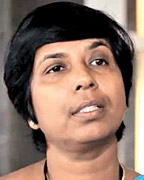 |
|
Sudarshini
Fernandopulle |
Deputy Minister of Higher Education and Research, Sudarshini
Fernandopulle said the Sri Lanka Freedom Party (SLFP) women's wing have
accelerated the training and promoting of their ground level women
activists. "We are keenly working towards capacity building of these
women and make them confident in the political world they have to face,"
she explained.
Commenting on the need to educate the individuals and propagate the
ideology at the decision making level, she said building leadership
qualities with a value and a vision, would give the women in the party
more importance in the long run. |

